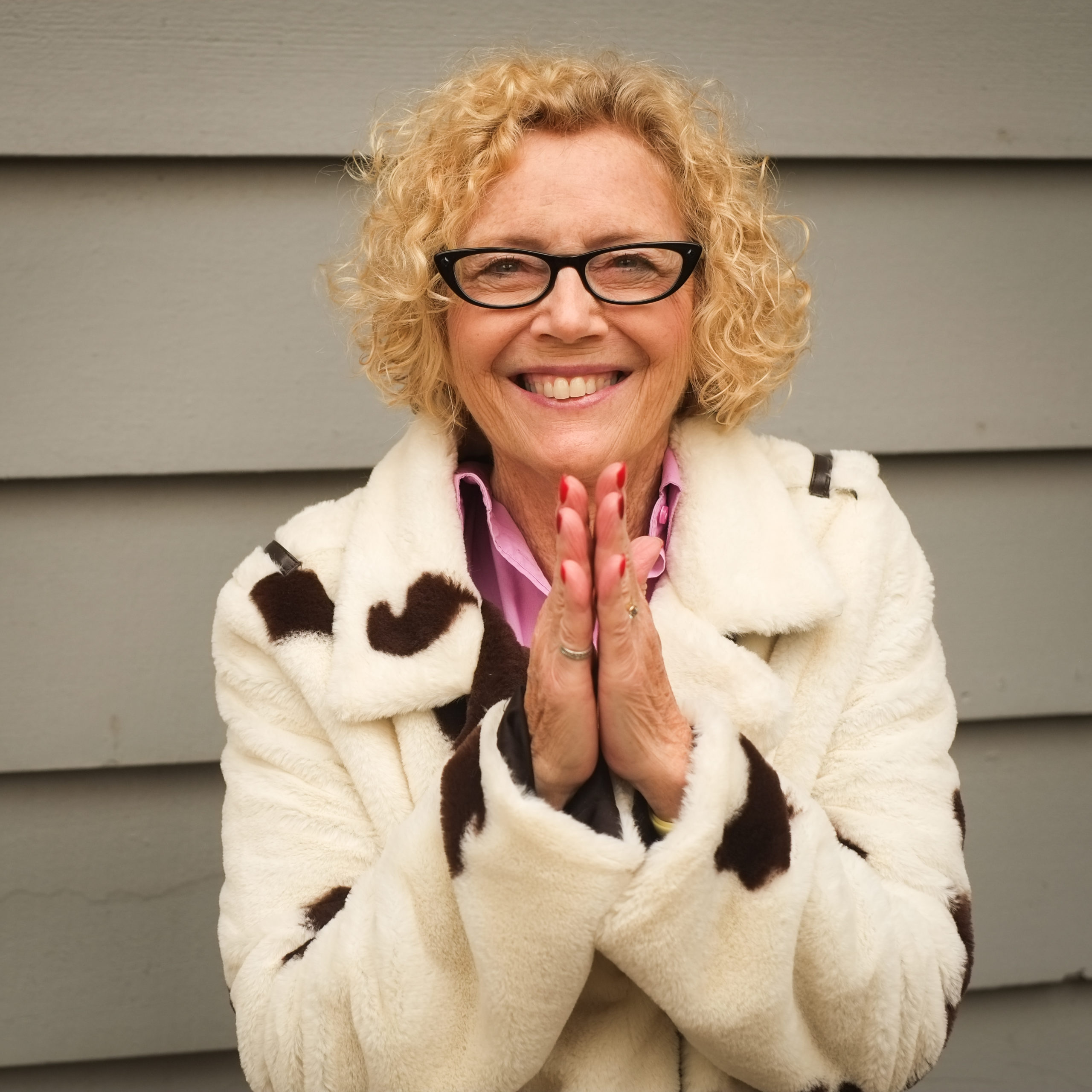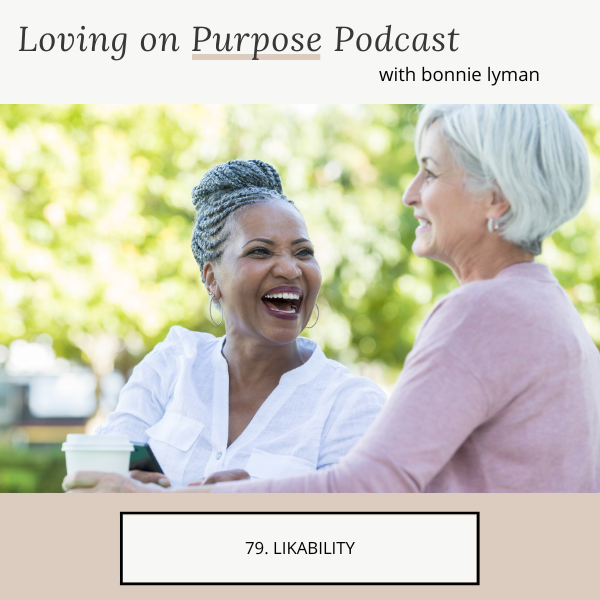
Work With Me
Well you are in the right place. Let's get started.


Episode 79 Likability Welcome to the podcast, loving On Purpose. I'm your host, Bonnie Lyman. If you're having trouble navigating through your relationships with your adult children, if you are struggling to connect with them or having specific challenges, you're in the right place. This is Bonnie Lyman and you're listening to the podcast, loving On Purpose, episode 79, likability. Hello, my friends. We're just coming off the 4th of July day celebration. I hope you had a good time. I hope you had a break. I'm glad to be living in America, having lived in Africa for 18 months. There's lots of things that I appreciate. Here, one of my most appreciated items is having water, clean water from a faucet right in my house. Anyway, welcome to the podcast. I hope I have something that will be of value to. Uplift you. You know, getting along with our adult children and when, especially when we are feeling resentful or maybe unimportant to them, it really comes back to how we feel about ourselves. And we, we are good people. They are good people. We just. Are at a time in our life perhaps where we are seeing things differently. I know it's hard, but it is our responsibility to fulfill our own needs, and I hope that we can all find hope in knowing. That there is always the chance that things will get better if things are not going the way you would like them to be. But today we're gonna talk about likability. Your likeability become becoming likable. And is that even possible or is that even necessary? Do we need to be more likable than what we really already are? And who's to say who measures what likable is? It's a very subjective outlook. On people. It's personal preference. It's strictly opinion, and. It really comes down to how much you like yourself. I too often worry about whether my kids like me. I don't worry so much if they love me, that if something were to happen to me, that they would be there to help and support me. But I sometimes wonder, I. Because of maybe the number of times that they call or don't call, you know whether they like me, whether I'm likable to them. I have five adult children. Sometimes I feel like some may like me more than other, but all that's really happening is that there are five adults now, plus my husband and I, so that is seven of us with our own adult opinions. And our distinct personalities are distinct sensitivities and just our way of doing things when we were all. A family. We're still a family, but when we're all living together and raising those kids and learning together and finding out new things, there were a lot of similar things, similar outlooks going on. But as we become adults, we start forming our own outlook on life, and it could be. Different than how they were raised. It could be, um, my children see things very differently from each other. I can tell by the way they raise their kids. They really don't have similar ways that they raise their kids. It's their. Uh, not especially similar to how they were raised. Everything is different because they, they have their autonomy, they have their agency to do it their way, and so we have to be careful with all these different opinions that we don't measure. Our likability if we're likable or not by whether our children agree with us or not. It seems that we get so personal when it comes to family. It. We kind of have the thought. We should all be more like each other. We should approve more of each other. We should act the same around each other, and we should connect more and more often with each other. But the fact is, We are not each other. We have our own brains. We are uniquely individuals separate from each other. I think of those times when I used to get as many in the bathtub as I could, and there was a similarity there and a. A connection that it's just not gonna be that way ever again. We were born likable. We shouldn't even be questioning whether we're likable. It's not that everybody is going to like us, but that doesn't mean anything. Has gone wrong that they're, it doesn't mean they're wrong for not liking us. It doesn't mean we're not likable because somebody doesn't like us. It's just, um, it's a combination of personalities that either mesh together. I. And like each other or just are different, so, A couple months ago, I got a little puppy. It's a Cava P, and I love that little dog. It's the perfect size, and I just greet her so happily every morning. And it's always around 5:00 AM which isn't my most favorite time to be getting up and taking a dog out to go to the bathroom. But I do it because I love her. And there, there's just no doubt in my mind that. I like that dog. There is nothing she needs to do to be more likable. Does she poop in the house Sometimes? Yes. And does she chew up my favorite pair of tennis shoes? Yes, but that doesn't make her any less likable to me. But there are some kind of dogs that I would never have. A CPU is a small snuggly dog that doesn't shed. I don't want a large dog that sheds just as there are people that don't want a smaller dog as I have, but that doesn't mean that those large dogs are not lovable or likable. By people that prefer smaller dogs. I can still like lock. Larger dogs, but just not want to have one. And so it kind of goes that way with people. We all want to be liked and we probably would like to be liked by everyone, but it's not possible. I. Because we all have different preferences. Some people like peaches, but if you don't, you could be the juiciest peach on the tree, and they're still people that won't and don't like peaches. That peach can't make it sell, can't make it, sell itself taste better so that everyone will like peaches, and that's okay. That's what makes us not a bunch of robots living with each other. We're all different. And those that we find have similarities or things that we're just kind of naturally attracted to or feel comfortable around, we say we like those people and we like being with them, but that doesn't mean that. Um, if people don't enjoy being with certain people, it's not because the people aren't likable. It's only a preference. They just don't, they just choose not to be around those kind of people. If we feel we're unlikable, it's only because of the thoughts we have about ourselves. We think we're unlikeable because we are focusing on what we don't like about ourselves. We can't make ourselves more likable, but we can focus on being more interested in other people than ourselves. And this will help us like us ourselves more, and when we like ourselves more, we're more fun. Pleasant and desirable to be around. It's just easier to be around people that feel comfortable in their own skin. When we like ourselves, we have the confidence to show up as our a authentic selves, and these are the kind of people that we like best if we like ourselves. We know everyone is likable by certain groups of people. If we are aware that we could find good in everyone, even if we don't want to necessarily hang out with them, we can be more accepting of other people's differences. It's good to be different. It's good to have a wide range of people, of different degrees of likability. It's time to get rid of the manual that says if we are a family, we should all be like each other. And want to hang out with each other. Some extended families are at their best when they're all hanging out together. And there are some that are at their best when there is spaces in their togetherness, and that is, okay. Whatever works for your family is the perfect way to associate with each other. Love is accepting each other for who they are and where they are. Our only expectation for us is to love and respect them just the way they are. Love is always the answer. Love is always the best option. I. I hope you have a great week, and I can't wait to talk to you next week. If you like this, be this episode and you felt it was of benefit to you, I ask you to share it with somebody that perhaps it could also benefit. But if you're still feeling kind of stuck in that you don't know how to apply what was talked about or. Where to start on, on changing your thoughts, on changing your perspective, on bettering your relationship. Get on a call with me and we can have a discussion and I can tell you how to apply it and where we start. And then you get to decide what you want to do about this relationship that maybe you're struggling with with your adult children. There is no reason to go on the rest of our lives struggling with our relationships with our adult children. Let's assume the best. Let's assume that we all love each other and we're just trying to figure out how to maintain our own boundaries and respect another one's. But I can help you with everything. So just go to bonnie lyman.com and book a call. I can't wait to hear from you. .